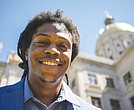Super Tuesday redux
3/6/2020, 6 a.m.
Lessons learned from Super Tuesday, the Democratic presidential primary contest held this week in Virginia and 13 other states and American Samoa, which was won overwhelmingly by former Vice President Joe Biden:
• Money can buy you ads, but not votes.
Former New York City Mayor Mike Bloomberg, who poured nearly $200 million into ad buys in Super Tuesday states since Jan. 1, didn’t win a single state.
According to news reports, Mr. Bloomberg spent almost five times more than the rest of the Democratic field combined, winning American Samoa’s primary and 18 delegates nation-wide. That comes out to about $11 million per delegate.
Meanwhile, former Vice President Joe Biden, who had some of the lowest ad spending among the candidates, swept Virginia and eight other states, while U.S. Sen. Bernie Sanders of Vermont won four others. Maine was still a toss-up on Wednesday morning, but is projected to be another win for Mr. Biden.
• Front-runner status doesn’t always determine your success down the road.
Pete Buttigieg, former mayor of South Bend, Ind., had a slim victory in the Iowa caucuses on Feb. 3, while Sen. Sanders won the New Hampshire primary on Feb. 11 and the Nevada caucuses on Feb. 22. Both seemed to have the wind at their backs going into the South Carolina primary on Feb. 29 and the Super Tuesday primaries.
But the wind shifted fast.
Mr. Buttigieg dropped out of the race Sunday night after a poor showing in South Carolina. And Mr. Biden, whose death knell was sounding after Nevada, sprang to life in South Carolina and in Super Tuesday states.
• Age doesn’t matter (for the most part).
In a Democratic field that started last year with more than 20 candidates, the leading contenders left standing after months of campaigning, hundreds of appearances and quite a few debates are the septuagenarians — Bernie Sanders, who is 78, and his younger opponent, Joe Biden, who is 77.
So much for 38-year-old Mr. Buttigieg.
The only other candidates left in the race as of Wednesday afternoon were U.S. Sen. Elizabeth Warren, 70, and Congresswoman Tulsi Gabbard, 38.
• Don’t underestimate the power of an endorsement.
Pundits are giving major kudos to Rep. Jim Clyburn of South Carolina, the highest ranking African-American in Congress, whose emotional endorsement of Mr. Biden just three days before the South Carolina primary sealed the black vote and Mr. Biden’s victory in that important state.
And when U.S. Sen. Amy Klobuchar dropped out of the race on Monday, she quickly mobilized her campaign staff in her home state of Minnesota, having them go door to door asking people to support Mr. Biden on Super Tuesday.
Mr. Biden, who had a muted presence at best in Minnesota, won that state on Tuesday; Sen. Klobuchar came in third, behind Sen. Sanders.
• In a crowded field in a volatile race, it may be best to wait until Election Day to vote.
Millions of voters in the Super Tuesday states cast their ballots early, only to see their preferred candidate drop out of the race before Election Day. People who voted for Mr. Buttigieg, Sen. Klobuchar and California billionaire Tom Steyer were especially smarting about their votes wasted on the three candidates who dropped out just days before Tuesday’s contest.
The solution, advocates are saying, is ranked choice voting. Voters would cast ballots ranking the candidates, so if their first choice drops out of the race or is eliminated, then their vote automatically goes to their second choice.
Maine will use ranked-choice voting this fall in the presidential election — the first in the nation to do so.
The Virginia General Assembly approved a pilot program for ranked-choice voting in local elections starting in July 2021.
We think it’s a good idea.
• A surge for your opponent doesn’t mean you’re being ganged up on.
Sen. Sanders’ supporters have voiced concern that Democrats who dropped out of the race, along with party officials and operatives, strategized and/or conspired to block the Democratic socialist from winning Super Tuesday states and the precious delegates needed to sew up the party’s nomination.
Yes, we believe that mainstream party loyalists are afraid of a Sanders win at the Democratic National Convention in July in Milwaukee, ultimately leading to a November match-up between Sen. Sanders and President Trump.
But we don’t see evidence so far of any underhanded efforts or Russian-style hacking to deny Sen. Sanders a fair primary contest. Until that happens, we believe Mr. Biden has won the lion’s share of Super Tuesday states fair and square.
But who knows what may happen at the convention. We hope Sen. Sanders’ positions advocating income equality by raising the minimum wage to $15 an hour, taxing the nation’s wealthiest individuals, providing universal health care and making public colleges tuition-free are woven into the party platform for November.
• Voting systems need to be re-evaluated and changed where needed before November.
No one should have to stand in line for hours to vote like many people in Texas and California did onTuesday. Long lines are a barrier to voting and hamper our democracy.
• Keep your eyes on the prize.
This may be the most important lesson of Super Tues- day — that Democrats remember what this fight is about: Beating Donald Trump.
On Tuesday night, President Trump’s re-election campaign manager tweeted out this message:
“President Trump will wipe the floor with whatever Democrat is unlucky enough to be the nominee.”
How typical and uncouth. But it’s a strong reminder that the Democrats’ contention going into Super Tuesday must be supplanted by unity and a big turnout at the ballot box in November.
Defeating President Trump is the No. 1 goal. #KeepYourEyesOnThePrize







